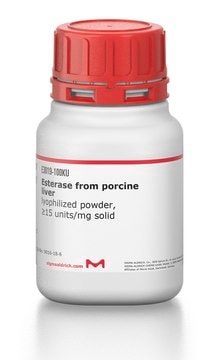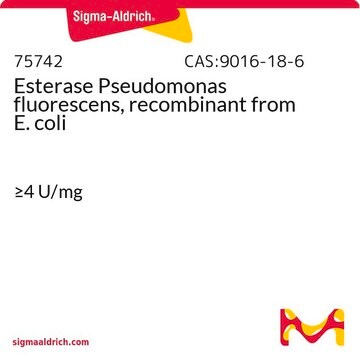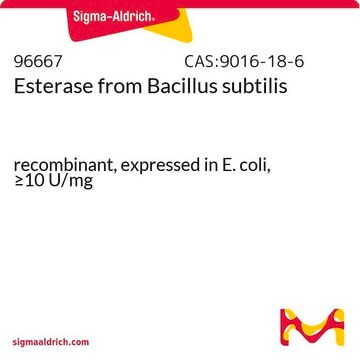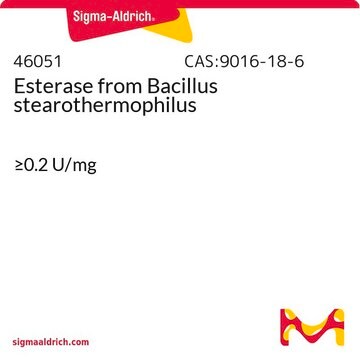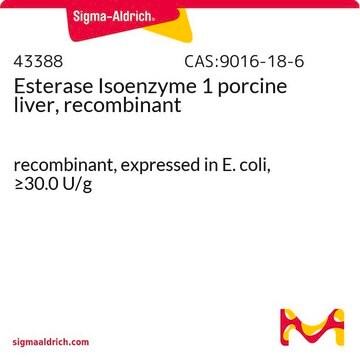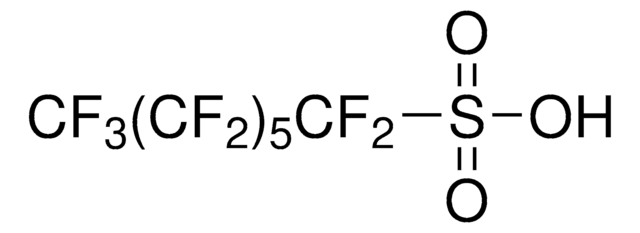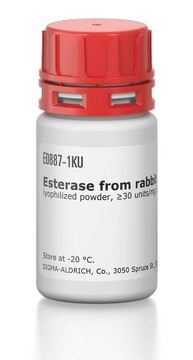79302
Esterase from Bacillus stearothermophilus
recombinant, expressed in E. coli, ≥4.0 U/mg
Sign Into View Organizational & Contract Pricing
All Photos(1)
About This Item
Recommended Products
recombinant
expressed in E. coli
form
crystalline
crystals
powder or flakes
specific activity
≥4.0 U/mg
storage temp.
−20°C
Looking for similar products? Visit Product Comparison Guide
Application
Esterase, from Bacillus stearothermophilus, may be used for the characterization of novel esterases . Product 79302 is recombinant and expressed in E. coli.
Biochem/physiol Actions
An esterase is a hydrolase that splits esters into acids and alcohols. The esterase catalyzes the transesterification of 1-phenylethanol.
The esterase catalyzes the transesterification of 1-phenylethanol.
Packaging
Bottomless glass bottle. Contents are inside inserted fused cone.
Unit Definition
1 U corresponds to the amount of enzyme which converts 1 μmol 4-nitrophenyl-L-acetate per minute at pH 7.5 and 30°C.
Signal Word
Danger
Hazard Statements
Precautionary Statements
Hazard Classifications
Resp. Sens. 1
Storage Class Code
11 - Combustible Solids
WGK
WGK 1
Flash Point(F)
Not applicable
Flash Point(C)
Not applicable
Certificates of Analysis (COA)
Search for Certificates of Analysis (COA) by entering the products Lot/Batch Number. Lot and Batch Numbers can be found on a product’s label following the words ‘Lot’ or ‘Batch’.
Already Own This Product?
Find documentation for the products that you have recently purchased in the Document Library.
Characterization and heterologous gene expression of a novel esterase from Lactobacillus casei CL96.
Young J Choi et al.
Applied and environmental microbiology, 70(6), 3213-3221 (2004-06-09)
A novel esterase gene (estI) of Lactobacillus casei CL96 was localized on a 3.3-kb BamHI DNA fragment containing an open reading frame (ORF) of 1,800 bp. The ORF of estI was isolated by PCR and expressed in Escherichia coli, the
Jessica Lusty Beech et al.
RSC advances, 12(13), 8119-8130 (2022-04-16)
Esterase enzymes catalyze diverse hydrolysis reactions with important biological, commercial, and biotechnological applications. For the improvement of these biocatalysts, there is a need for widely accessible, inexpensive, and adaptable activity screening assays that identify enzymes with particular substrate specificities. Natural
XieMei Tang et al.
Critical reviews in eukaryotic gene expression, 22(3), 179-187 (2012-11-13)
Tuberculosis remains one of the most prevalent and deadly infectious diseases, largely due to the emergence of multidrug-resistant and extensive drug-resistant Mycobacterium tuberculosis, especially the coinfection with HIV. Mycobacterium Ag85 complex (Ag85A, B, and C), with a carboxylesterase consensus sequence
Zhe-Yi Hu et al.
Analytical and bioanalytical chemistry, 405(5), 1695-1704 (2012-12-15)
Dabigatran etexilate (DABE) is an oral prodrug that is rapidly converted by esterases to dabigatran (DAB), a direct inhibitor of thrombin. To elucidate the esterase-mediated metabolic pathway of DABE, a high-performance liquid chromatography/mass spectrometry based metabolite identification and semi-quantitative estimation
Keun Na et al.
International journal of cancer, 133(2), 408-415 (2013-01-16)
Although alpha-fetoprotein (AFP) is currently the major serologic biomarker for hepatocellular carcinoma (HCC), it cannot efficiently distinguish this cancer from other forms of liver disease in early diagnosis due to its low sensitivity. The aim of this study is to
Our team of scientists has experience in all areas of research including Life Science, Material Science, Chemical Synthesis, Chromatography, Analytical and many others.
Contact Technical Service